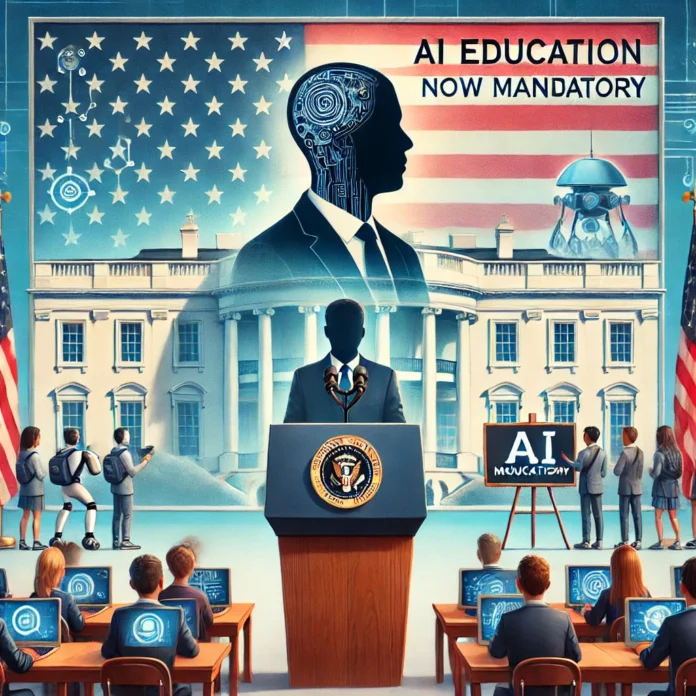In a significant education policy announcement, President Donald Trump declared yesterday that artificial intelligence education will become «mandatory» in American schools, signaling what could be the most substantial federal intervention in K-12 curriculum in decades.
Presidential Directive on AI Education
Speaking at a technology-focused town hall in Columbus, Ohio, Trump emphasized that American technological competitiveness hinges on preparing the next generation for an AI-dominated future.
«AI is going to be everywhere, it already is. Our kids need to understand it, they need to master it,» Trump stated. «I’m making it mandatory – AI education in every school in America. We can’t fall behind China on this. It’s going to be a must-subject, just like reading and math.»
The announcement comes amid growing concerns about America’s technological competitiveness, particularly against China, which has made significant investments in artificial intelligence research, development, and education. According to the National Center for Education Statistics, only 45% of American high schools currently offer any form of AI or advanced computing curriculum.
Implementation Challenges and Timeline
While the President’s declaration has generated significant attention, education policy experts note that the federal government has limited authority to directly mandate curriculum changes, as education policy is primarily controlled at the state and local levels.
Dr. Eleanor Richards, Education Policy Director at the Brookings Institution, explained: «The administration would need to work through incentive programs, federal funding mechanisms, and collaboration with state education departments to realize this vision. This isn’t something that can simply be decreed from Washington.»
The White House later clarified that the initiative would begin with a task force to develop model AI curriculum standards, with implementation expected to start in the 2026-2027 school year, focusing initially on middle and high schools.
Bipartisan Support Amid Political Division
In a rare moment of bipartisan agreement, the announcement has received cautious support from both sides of the political aisle. Democratic Senator Mark Warner of Virginia, who has championed technology education initiatives, called the focus on AI literacy «absolutely necessary for America’s future,» though he expressed concerns about funding mechanisms.
Republican Senator Josh Hawley praised the initiative as «forward-thinking» but emphasized that implementation should «respect state sovereignty in education matters.»
Technological and Educational Considerations
Industry leaders have long advocated for more robust technology education in American schools. OpenAI CEO Sam Altman, responding to the announcement on social media, wrote: «This is the right direction. AI literacy will be as fundamental as reading literacy in the coming decades.»
Education professionals, however, have raised practical concerns about implementation. The American Federation of Teachers highlighted significant challenges, including:
- Teacher training gaps in AI education
- Technological infrastructure limitations in many school districts
- Socioeconomic disparities in access to computing resources
- The need for age-appropriate AI education frameworks
Jennifer Morales, President of the National Education Association, stated: «While we support modernizing curriculum, this requires significant investment in teacher professional development and school infrastructure. You can’t mandate what you don’t fund.»
Economic and Workforce Implications
The initiative aligns with labor market projections showing dramatic growth in AI-related careers. The Bureau of Labor Statistics forecasts that AI-related jobs will grow by 37% over the next decade, significantly outpacing overall job growth.
«This isn’t just about creating AI engineers,» said Labor Secretary Dan Scavino. «It’s about ensuring every American worker has the digital literacy to function in an AI-augmented workplace, regardless of their field.»
Next Steps
The Department of Education has been directed to form an AI Education Task Force within 60 days, comprising education experts, AI specialists, and industry representatives. This group will develop implementation guidelines and funding recommendations.
White House sources indicate that the administration will seek approximately $4.5 billion in appropriations for the initiative, covering teacher training, curriculum development, and technology infrastructure grants to states and school districts.
As this policy takes shape, it represents a recognition from the highest levels of government that artificial intelligence is no longer a specialized technical field but a fundamental component of 21st-century education and citizenship.




